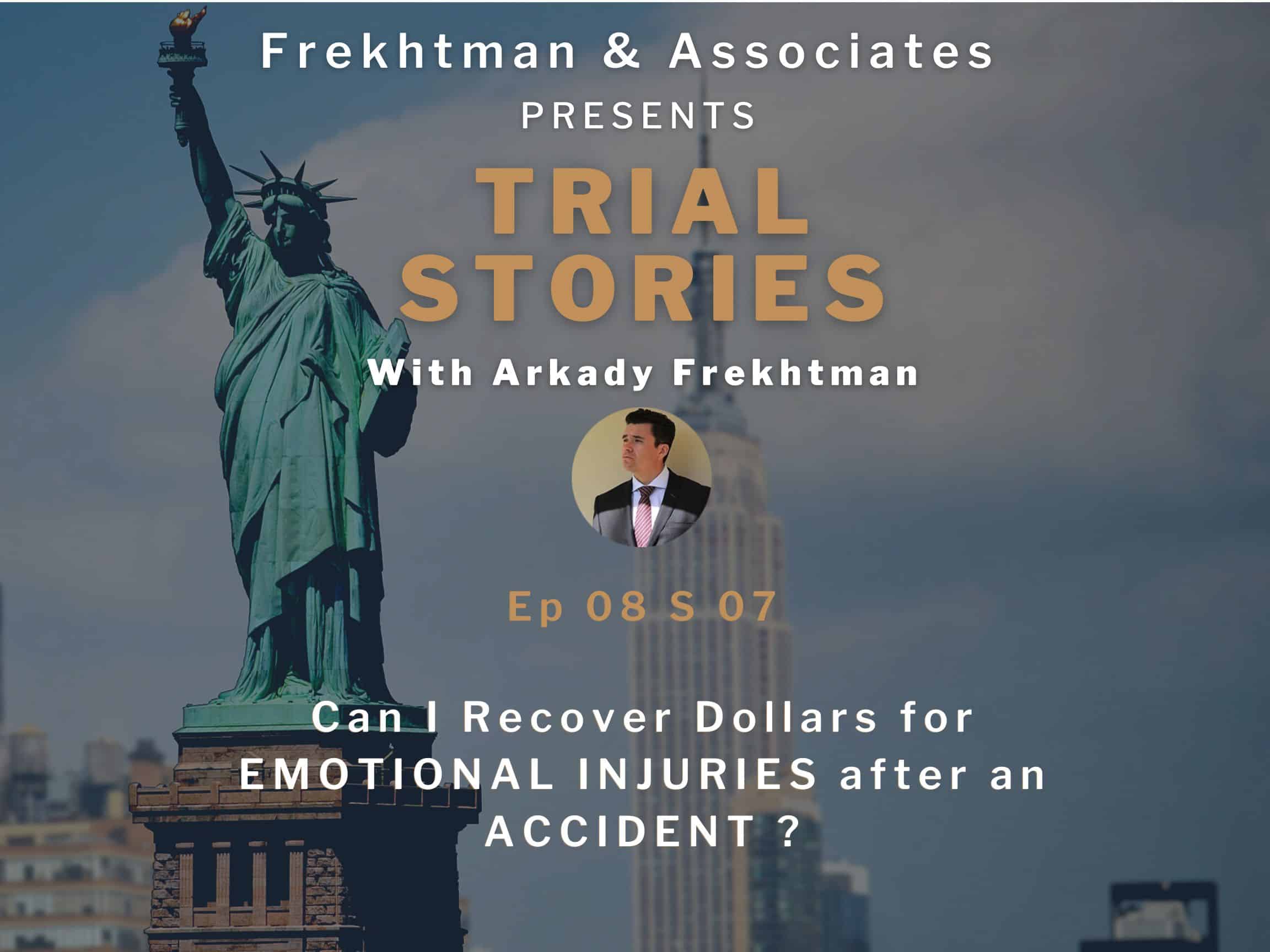EP 08 S 07: Can I Recover Dollars for EMOTIONAL INJURIES after an ACCIDENT ?

In this episode I explain how you could recover compensation for emotional distress after an accident. Learn how you can sue the at-fault party for your anxiety, emotional distress, or other emotional challenges following an accident.
Pick Your Favorite Channel: Apple Podcast | Google Podcasts | Spotify | Stitcher | RSS
Full Transcript
Hi, everybody. This is our Arkady Frekhtman in New York City, personal injury trial attorney. And today, we’re answering the question, what emotional injuries are compensable under New York law? Meaning, if I was in any type of traumatic incident, a car crash, a slip and fall, and I got injured, can I recover for my emotional injuries, my mental anguish, mental distress? Mental health is very, very popular right now. It’s becoming a very popular topic and a lot of people are suffering mental health issues after the COVID-19 pandemic. And what’s been popping up are Zoom sessions you can do, video sessions with therapists and it’s very popular and there’s all different types of therapists. There’s psychologists, psychiatrists, different types of mental health practitioners. And it’s very important, and we saw, for example, Simone Biles, she withdrew from the Olympics because she said, “Look, I need a mental health break because it’s a lot of stress,” right?
So can you recover for emotional injuries in New York? And the answer is, yes, you can recover for the physical injury and the emotional pain and suffering due to a car crash, a slip and fall, any type of personal injury. You can. And typical issues that people have when they have an inability to handle or manage the emotional trauma, some examples are, people just get fatigued, they have sleeping problems, they feel numb and disconnected, they want to be alone, they don’t want to be with other people or social interactions, they get mentally confused. And some of that is similar to a traumatic brain injury. They have difficulty concentrating, a sense of shock or disbelief, they feel guilty about the accident, they get irritable, angry with mood swings, they withdraw from others and they want to spend time alone.

So the judge will read these instructions to the jury and then the jury, based on these instructions, based on these rules, is going to answer questions. And one of the questions will be, was the defendant negligent? Yes, right? Was the defendant’s negligence a substantial factor in causing the injury? Yes. So that’s liability. Now, you’ve proven that. Now you get to damages. In damages, they ask them to allow for a sum of money that will justly and fairly compensate the plaintiff for all losses resulting from the injuries and disabilities he or she suffered. And that is the language of the damages charged in New York. It’s called a charge because they charge the jury. It’s just a jury instruction. They read it, and then the jury will then have to put an amount for the damages. So it’s a sum of money that’ll justly and fairly compensate for all losses. And the purpose of it is to restore the plaintiff to the position he or she would’ve been in before the injury.
And that’s based on the McDougald versus Garber case from 1989. So that is in the pattern jury instructions. Now, with injury, pain, and suffering, and disability, these are all separate components. And I think they should be argued separately. You have the injury, you have the pain, you have the suffering, you have the disability. And then, according to the pattern jury instructions, pain and suffering encompasses all general non-economic damages. It’s in the CPLR. It’s the CPLR 4111 in section D, E and F. So it encompasses everything, right? Pain and suffering encompasses things like shock and fright, mental suffering, disfigurement, emotional consequences of an injury. I believe you cannot get separate line items for it in the verdict sheets. So when the jury will fill it out, they’ll just be asked, “What is the amount that you allow for pain and suffering?”

Number two, it hurts the ability of someone to participate in activities which were part of the person’s life before the injury. So that could be anything that the person enjoyed, right? It could be working, it could be going to the beach, it could be sports. And then an emotional or psychological trauma, of course, could affect that. And then the third part is to experience the pleasures of life. Same thing, right? Experiencing the pleasures of life, everyone likes to do different things, spend time with family, with loved ones, with friends, go to the beach or play sports, or maybe read a book, whatever you’d like to do, watch something nice on Netflix, but you can’t do it because you have this emotional trauma. So I think that could be fit into loss of enjoyment of life as well.
And then there’s another charge, which is 2:284, and that is recovery for emotional distress and the physical consequences of the emotional distress. And this charge, basically, if somebody proves that they have an emotional injury, right? That they have mental anguish, but you have to prove it, so you have to testify that it happened, you have to have a journal. You don’t have to have a journal, but it’s a good idea to have a journal to show instances of the emotional distress. If you’re doing these Zoom sessions with a therapist, it’s good maybe to have the therapist come and testify. It’s always good to see a professional to get it diagnosed, either from a psychiatrist, psychologist, therapist, any kind of professional because then it’s diagnosed just like you would diagnose an injury like a herniated disc. So you diagnose the emotional injury.

So getting back to this, so this is a specific charge and they tell you, this is not a charge that has anything to do with liability, right? Liability is a separate issue. Sometimes you even have two separate trials, a liability trial bifurcated with the damages trial coming after. So this charge, 2:284, is only about damages. So when they’re allowing for an amount to compensate you for your pain and suffering, if you’ve shown emotional injuries, you read this charge in addition to it. And this charge basically says mental suffering, emotional, and psychological injuries, and any physical consequences from the emotional distress caused by the defendant. So if you’re in a car crash, you can sue for the emotional distress, the fact that you’re having trouble sleeping, you’re worried, you have anxiety, you’re scared to get in a car now, but you could also sue for any physical consequences.

The gradual one is hard to prove, it’s not easy, but it can be proven. And the stress has to be above average. So it has to be greater stress than all the other employees in your company go through on a daily basis because if it’s the same stress, it’s not enough. It has to be abnormal because now you’re bringing a worker’s compensation claim only due to emotional injury. So it has to be abnormal. And there are certain actions on the part of the employer, on the boss, that are protected. And what that basically means is they cannot be sued for these actions. And they include making personnel decisions because they’re the employers, they can make personnel decisions. Basically, it’s their team, they could decide, “Hey, how do I want to organize my team?” They could promote someone, demote someone. They can transfer someone. They could take disciplinary action and they can fire someone, terminate them. Those are all protected actions.
So you can’t have a worker’s comp case based on that. But if it’s an unprotected action and it causes abnormal stress, then you can. And purely mental injuries are compensable under the worker’s compensation system in New York. So I hope this has been helpful. This is just a little bit of a rundown. And I wanted to talk about one other thing because there’s a new book out that I’m reading. It’s a really excellent book. It’s called Damages Evolving. It’s by a jury consultant, David Ball, and also by some trial attorneys, Artemis Malekpour, she works with David Ball, and also by Nick and Courtney Rowley, who are part of the Trial By Human. Actually, Nick and Courtney, they started the Trial By Human and she has a Trial By Woman section where they teach a lot of these topics that I’m talking about like telling the client’s human story, things like that.

So they give you examples of how to argue this. And one of them is also shame and humiliation. Somebody could feel a lot of shame after an accident, or they could feel shame because they are severely and permanently injured. Let’s say somebody is a breadwinner and they are the head of the household and they feed the entire family. Now they had a spinal fusion, now they can’t work. They feel shame. They feel like I’m now a burden to my family, to my kids, to my wife. And maybe I was supporting other people like my sister. Now, I feel humiliated. And that’s something that the jurors can very, very much empathize with and then allow for much higher verdicts. So this is a great point about how emotional injuries can be used.
And one of the other things that they talk about in another chapter is actually the fact that the trial itself can be humiliating or the fact that you have to suffer through the trial. The only reason, a lot of the times, that a plaintiff has to suffer through a trial is because the defendant won’t make a fair and reasonable offer, right? They’re just being cheap. They’re nickeling and diming you, and then they’re forcing you to go through a trial, forcing you to relive and rehash all of these horrible memories of how the traumatic injury occurred and of all your medical care, and that could lead to emotional distress like PTSD. So they have very innovative ways to bring it up. I’m reading the book now, I really like it. I’m going to maybe do a few more videos about it in the future.
So I hope this has been helpful. This is how you can recover for emotional injuries after any type of personal injury, like a slip and fall, a car crash. The most important thing is to document everything, keep a diary or a journal. Don’t live with the injury in silence. Go to a healthcare practitioner, whether it’s a psychiatrist, psychologist, therapist. Do it in person, do it over Zoom, document all that. Reach out to witnesses, especially independent witnesses like neighbors, coworkers, people that could tell your story, who you were before the accident, and how your life has changed into who you are now. And then with those things, you’d have a really strong case because you have the medical component of it being diagnosed, you have the actual journals of going through it and evidence that you have been going through it with the diaries, and then you also have other people that are coming to court giving depositions or giving trial testimony, sometimes as quick as five or 10 minutes, but these other people are conveying your story.
They’re explaining how this emotional, psychological distress, mental anguish has changed you, right? And that’s very, very powerful. I can’t stress that enough. Okay. I hope this has been helpful. Let us know what questions you have and we are here for you. Please like and subscribe to our channel so we can continue making videos for you. And you could always text me if you have a question. I’d be happy to text with you or get on a call to give you a free consultation. Okay. Have a great day, everyone. Enjoy the weekend. And we will talk to you very soon.
Get Legal Help in New York
If you have suffered a personal injury due to someone else’s negligence, you need to contact our specialized lawyers. We will carefully investigate all the facts of your case, review all your medical records, and then fight hard to win the maximum compensation available to you. We want every client to fully recover for all lost wages, pain and suffering, medical expenses, and other losses.
Video Version:





